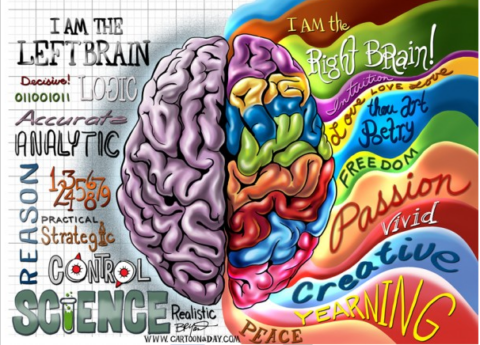
Storytelling: Our brain loves stories (c) Bryant Arnold
In our first blogpost on storytelling we promised we’d give you a reason why storytelling works as a marketing tool. Here it is:
The basic assumption of storytelling is that the unconscious mind controls a substantial part of human behaviour. Hence, also the purchasing behaviour. Or, as Werner T. Fuchs formulates it: The unconscious mind makes the purchasing decision, the conscious mind justifies it.
In his book „Warum das Gehirn Geschichten liebt“, Werner T. Fuchs presents mechanisms of storytelling. In it, he doesn’t only discuss what makes a story a story, but he also offers numerous examples from the world of marketing and innovatively links them with the latest discoveries in brain research.
Stories, as Fuchs points out, help the brain save “computing capacities”. This is due to the brain seeking patterns in order to understand more quickly and easily. Therefore, it creates stories within the subconscious mind, especially initiation stories. The aim of storytelling is to tell stories in patterns that have worked for centuries, because they are neurally linked in the brain. That is to say, understanding and processing such stories requires less computational effort. More so: stories stimulate the right brain. That is why stories, which are easily processed, evoke emotions by appealing to the subconscious mind.
This explains why the same types of stories always fascinate us. In the past – before textualisation – set pieces and props helped story tellers to remember stories. Homer repeatedly uses: “And they lifted their hands to a deliciously prepared meal”.
That’s exactly what customers are supposed to do when hearing a story told convincingly: grab hold of whatever is offered to them. Customers will more likely do this, according to Werner T. Fuchs, if the story that’s told connects with them and their primal experiences. This is the starting point of the skilled storyteller.
So the advantage of a well-told story first lies in adequately representing your company; secondly in linking to an archetype and thirdly evokes emotions in potential customers by telling them an ancient story or connects with the customers’ primal experiences.
It’s not only the way Fuchs reveals the storytelling ‘mechanism’, but also an entire series of exercises he offers to help find and tell your own company story, that make this small book worthwhile the read despite occasional platitudes. Not to mention the extensive literary index, which includes specialised literature as well as many examples for cinematic and literary storytelling.
Further reading: Werner T. Fuchs, Warum das Gehirn Geschichten liebt. München 2009. (not available in English)
In English: Klaus Fog, Christian Budtz et.al., Storytelling: Branding in Practice. Kopenhagen 2010.
All our storytelling articles (published so far):
Storytelling I: What’s the Story?
Storytelling II: Why it Works
Storytelling III: Where Does One Begin?
Storytelling IV: Best Practices Google Nexus
Storytelling V: Storytelling With Style
Storytelling Best Practices: